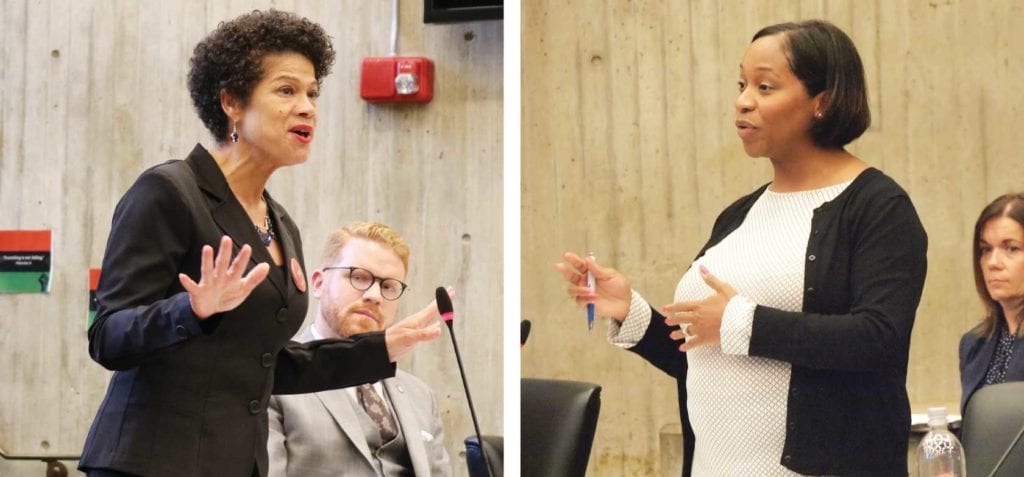Councilors take on policing, MBTA service
Campbell wants accounting of BPD equipment, training, tactics

Boston City Councilors Julia Mejia and Andrea Campbell have called for a hearing to address non-lethal force restraint tactics by the city’s police.
The hearing order, introduced during the June 10 council meeting, recognizes that while procedures such as physical restraints to the neck and throat are not taught by the Boston Police Department, “its rules and procedures do not explicitly prohibit such measures.” The order notes that, according to a BPD spokesperson, officers may deploy “the least amount of force necessary to overcome the resistance. There’s no policy on ways to do it.”
Mejia said that she is tired of conversations without action.
“We don’t need another hearing to tell us that black and brown people are being discriminated against,” she said.
She recognized the momentum of the country’s recent protests against police brutality. “We are on the verge of monumental change, and we can all feel it,” she said. “We just need to keep on pushing.”
Restraint tactics were just one of many policing issues discussed during the meeting.
Many protesters and bystanders were left stranded on Sunday, May 31 after the MBTA suddenly shut down after evening demonstrations. Protestors were forced to find their own way home. Shutdowns happened again on June 2 and 3. Councilors Michelle Wu and Mejia offered a resolution urging the MBTA to protect peaceful assembly with reliable public transit services.
“There were several instances in which those who had come as peaceful protestors felt scared, trapped and really had their plans turned upside down when the MBTA closed stations,” said Councilor Michelle Wu.
Councilor Kenzie Bok agreed. It was unsafe for young people, she said, especially youth of color, to get home that night.
“There’s a real difference between closing a station for 20 minutes because you’re experiencing crowding and shutting off the whole network of downtown stations,” she said.
Councilor Lydia Edwards added that the community should have a say before public transit is “automatically commandeered by the police at any time.”
“[The MBTA is] not an arm of the police, and I would like to keep it that way,” she added.
The resolution didn’t pass, however, as Councilors Michael Flaherty and Frank Baker voted against its adoption. Flaherty said that it is dangerous not to allow police and first responders to commandeer public transit during mass-casualty situations, like the Boston Marathon bombing.
Edwards countered that some police officers on May 31 were not responding to an emergency situation, but rather seeking to arrest individuals.
“This is a question of policing, and whether policing should be responding to all kinds of emergencies,” she said. “I do not see this as a limit for public safety officers or public safety personnel to be responding to an emergency.”
Councilors also advocated for a seat on the MBTA Fiscal Management Board. The board votes on several MBTA-related issues, including the recent decision to disallow public transit vehicles to transport police officers to protests.
“The fact that we don’t have a seat at the table concerns me,” said Flaherty. Councilor Ed Flynn agreed, and said their presence on the board is critical.
Police in schools
Mejia and Council President Kim Janey also questioned police presence in schools, calling for a hearing regarding restorative justice practice and the role of police.
Studies show that school disciplinary systems disproportionately punish black and brown children. Campbell cited research on the “cradle-to-prison” pipeline. She said that one in three black boys and one in six Latino boys go to prison, compared to one in 17 white boys.
Restorative justice is a method used in schools that empowers students to resolve conflicts with the help of social workers and psychologists, said Mejia. This would be an alternative to punitive disciplinary measures used on students.
Mejia also called for a hearing regarding certain university police units, who she said joined the BPD at the city’s recent protests.
Wu requested information from the police department under a 17F order asking for a full list of BPD equipment, training and tactics over the last few years. Studies have found heavily militarized law enforcement forces to escalate situations and be more likely to result in civilian casualties, she noted.
Councilors Flynn and Campbell called for a hearing to investigate hate crimes and discrimination.
“The victim of a hate crime or racist incident might be too fearful to come forward and report to authorities such as public safety personnel,” Flynn said.
Campbell agreed. “Folks need attorneys, they need places to go to talk about the discrimination they feel almost every day, and sometimes they are just hit with barriers.
Campbell said that agencies like the Commission Against Discrimination are often under-resourced, and Edwards noted that the Walsh administration’s Human Rights Commission is “woefully underfunded.”
June 1 marked the beginning of pride month. Councilor Liz Breadon, Boston’s first out lesbian councilor, commemorated the 1969 Stonewall Riots and advocated for the protection of transgender or gender-non-conforming people of color, who are at a heightened risk of violence and police brutality.
“Let’s not forget that the first pride march was a protest,” agreed Councilor Mejia. “A protest led by trans people of color, people who were fed up with having to lie about who they were and the people that they loved.”






